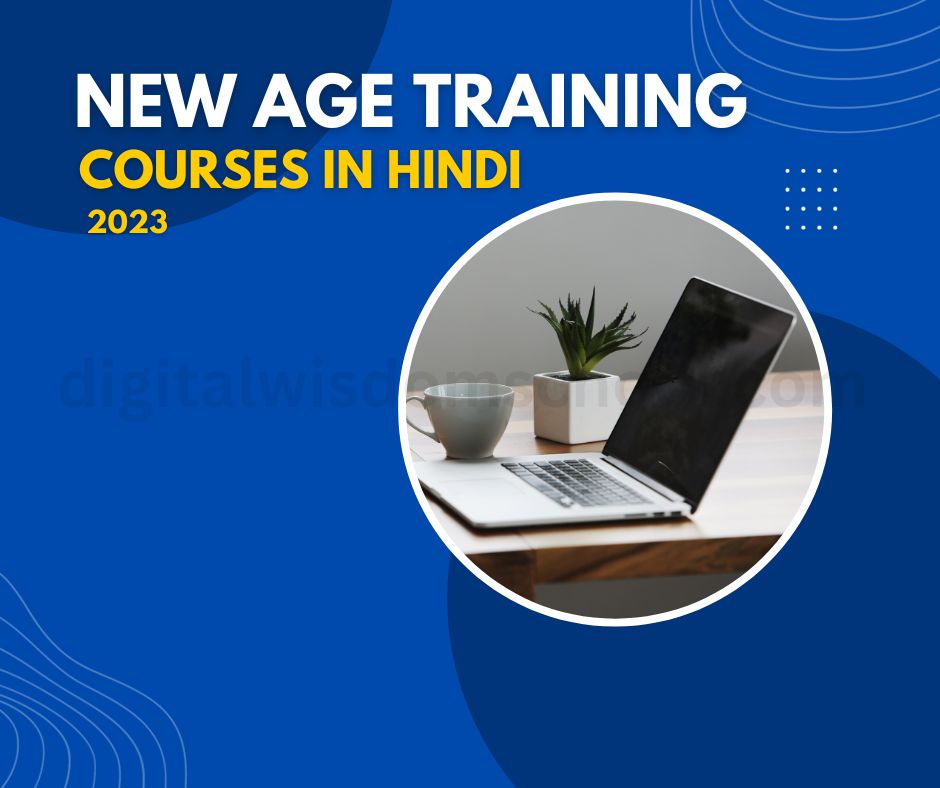New Age Training
“New age training” typically refers to modern and innovative approaches to education, skill development, and training that leverage advancements in technology, changes in learning methodologies, and evolving workplace needs. Here are some key aspects and trends associated with new age training:
Online Learning and E-Learning Platforms:
Flexibility and Accessibility: New age training often involves online courses and e-learning platforms that offer flexibility in terms of when and where individuals can access learning materials.
Microlearning:
Short, Digestible Content: Microlearning involves delivering content in small, focused units. This approach is gaining popularity as it aligns with the modern learner’s preference for short, easily digestible lessons that can be consumed on-the-go.
Virtual and Augmented Reality (VR/AR):
Immersive Learning Experiences: VR and AR technologies are being increasingly integrated into training programs to create immersive and interactive learning experiences. This is especially valuable in fields where hands-on practice is crucial.
Gamification:
Game Elements in Learning: Gamification incorporates game-like elements, such as points, badges, and rewards, into educational content. This approach is designed to make learning more engaging, motivating, and enjoyable.
Artificial Intelligence (AI) in Adaptive Learning:
Personalized Learning Paths: AI is being used to analyze learner behavior and tailor educational content to individual needs. Adaptive learning platforms can adjust the difficulty and content of lessons based on a learner’s progress and preferences.
Soft Skills Development:
Emphasis on Communication and Collaboration: New age training recognizes the importance of soft skills, such as communication, teamwork, and adaptability. Training programs often integrate activities that foster the development of these skills.
Collaborative Learning Platforms:
Social and Collaborative Features: Many modern training platforms include social and collaborative features, allowing learners to interact with instructors and peers. This facilitates discussion, knowledge sharing, and a sense of community.
Data Analytics for Performance Monitoring:
Monitoring and Assessment: New age training often incorporates data analytics to track learner progress, identify areas for improvement, and assess the overall effectiveness of training programs.
Remote and Hybrid Learning Models:
Adaptation to Changing Work Environments: With the rise of remote work, new age training recognizes the need for flexible learning models that can accommodate individuals working from different locations and time zones.
The landscape of training and education is evolving rapidly, driven by technological advancements and the changing nature of work. New age training aims to provide individuals with the skills and knowledge needed to thrive in today’s dynamic and digital-centric environments.
What is the school code for new age training?
I’m sorry, but there isn’t a universal “school code” for new age training. School codes typically refer to specific identification codes assigned to educational institutions for various administrative purposes, such as standardized testing, financial aid applications, or recordkeeping.
New age training, as mentioned earlier, is a concept referring to modern and innovative approaches to education and training. It doesn’t represent a specific school or institution with a standardized code. If you are looking for information about a particular training program, school, or institution, you might need to specify the name of the organization or provide more details to get accurate information.
New Age Training Courses
New age training courses encompass a variety of modern and innovative approaches to education and skill development. These courses are often designed to meet the evolving needs of learners in a rapidly changing world, incorporating technology, interactive methods, and up-to-date content. Here are some examples of new age training courses:
Online Learning Platforms:
Platforms like Coursera, edX, and Udacity offer a wide range of courses on topics ranging from technology and business to arts and humanities. These courses often feature video lectures, interactive quizzes, and forums for discussion.
Coding Boot camps:
Coding boot camps, such as General Assembly, Le Wagon, and Codecademy, provide intensive, short-term programs focused on teaching coding and programming skills. These courses are designed to quickly prepare individuals for careers in technology.
Data Science and Analytics Courses:
Courses in data science and analytics, offered by platforms like Data Camp, Khan Academy, and LinkedIn Learning, teach skills in data analysis, machine learning, and statistical modelling.
Project Management Certification:
Courses leading to certifications in project management, such as those offered by the Project Management Institute (PMI) or Scrum Alliance, teach project management methodologies and skills.
Digital Marketing Courses:
Given the importance of digital marketing in the modern business landscape, courses from organizations like Hub Spot Academy, Google Digital Garage, and Facebook Blueprint cover topics like social media marketing, SEO, and online advertising.
UX/UI Design Courses:
Courses from platforms like Interaction Design Foundation or Coursera’s UX/UI Specializations provide training in user experience (UX) and user interface (UI) design.
Cyber security Training:
With the increasing importance of cyber security, training courses from organizations like Cybrary or CompTIA teach skills related to ethical hacking, network security, and cyber security management.
Soft Skills and Leadership Development:
Courses focused on soft skills and leadership development, available on platforms like LinkedIn Learning, focus on communication, teamwork, emotional intelligence, and leadership.
Block chain and Crypto currency Courses:
Given the rise of block chain technology, courses on platforms like B9lab or Block chain at Berkeley offer training in block chain development, smart contracts, and crypto currency.
Artificial Intelligence (AI) and Machine Learning Courses:
Platforms like deeplearning.ai, Fast.ai, and edX offer courses on AI and machine learning, covering topics such as neural networks, deep learning, and natural language processing.
These examples represent just a fraction of the diverse range of new age training courses available. The key characteristic of these courses is their adaptability to the changing demands of industries and their use of modern instructional methods and technologies. Individuals seeking new age training opportunities can explore these courses on various online platforms, universities, and specialized training organizations.
New Age Training Reviews
When seeking reviews for new age training courses or programs, it’s essential to consider multiple sources and perspectives to form a well-rounded understanding of the training’s effectiveness. Here are some ways to find reviews for new age training:
Online Platforms:
Check the reviews and ratings on the platforms where the courses are hosted. Websites like Coursera, edX, Udacity, and others often provide user reviews and feedback for each course.
Independent Review Websites:
Look for reviews on independent websites that specialize in course reviews and educational content. Examples include Class Central, Course Report, or Trust pilot.
Social Media and Forums:
Join relevant communities on platforms like Reddit or LinkedIn. Many learners share their experiences and reviews of different courses in these communities.
YouTube and Video Reviews:
Some learners share their experiences with new age training courses through video reviews on platforms like YouTube. Watching these reviews can provide insights into the course content, structure, and effectiveness.
Testimonials on Course Websites:
Check if the course or program’s official website includes testimonials from past participants. While these are curated, they can still offer some insights into the positive aspects of the training.
Network with Peers:
Connect with professionals in your industry or field of interest and ask for recommendations. Personal recommendations from people you trust can be valuable in choosing the right training program.
Professional Reviews:
Look for reviews or endorsements from professionals or organizations in the industry. Sometimes, industry experts provide insights into the relevance and quality of certain training programs.
Ask for Trial Access:
Some training platforms offer trial access or a money-back guarantee. Taking advantage of these options allows you to explore the course content before making a commitment.
Remember that individual experiences can vary, so it’s important to consider a range of opinions. Look for common themes in reviews, such as the quality of content, the effectiveness of instruction, the level of engagement, and the overall value for the investment.
When reading reviews, be aware of the context in which they are given, as personal preferences and learning styles can influence perceptions. Additionally, check the recency of the reviews, as the relevance of a course might change over time with updates and improvements.
























